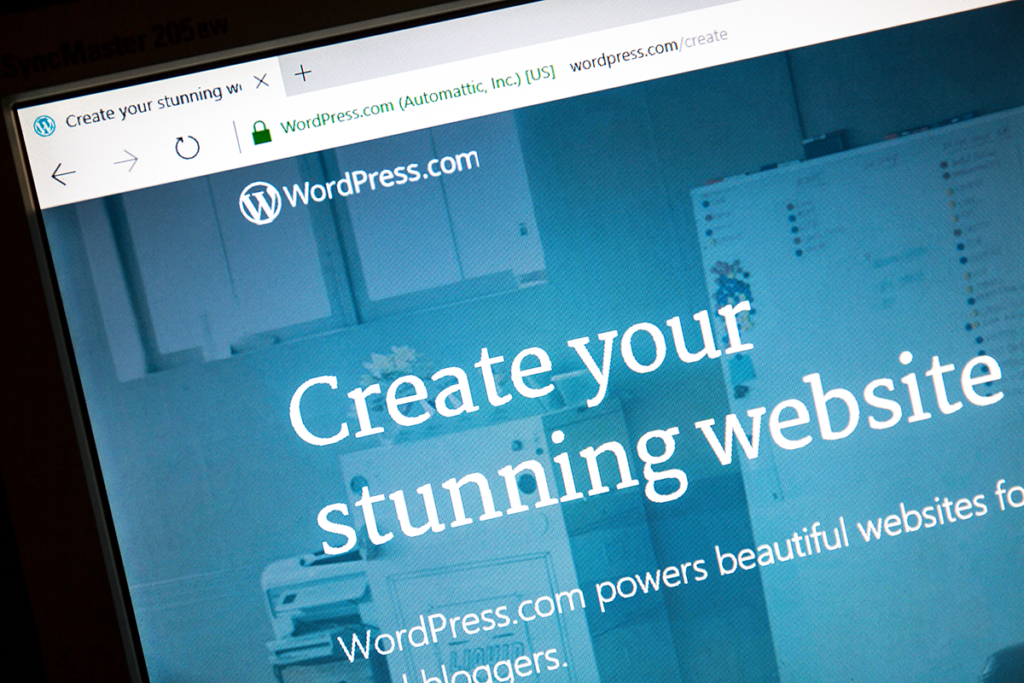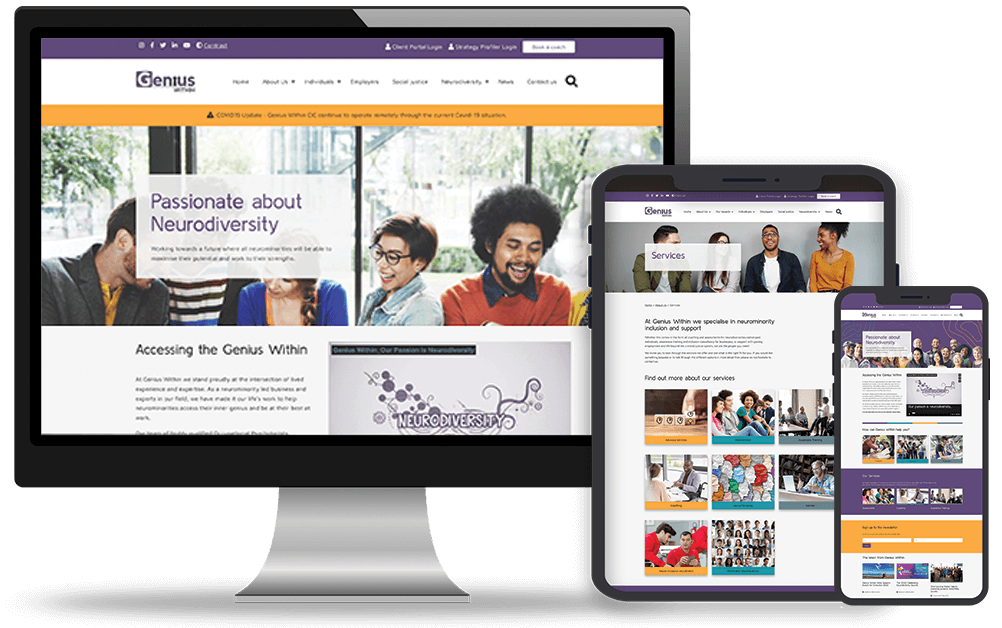WordPress is used by more than 75 million websites across the internet, powering some of the world’s largest sites and brands. However, as there are free and paid for versions, the versatility of this dynamic CMS is often misunderstood. This blog debunks some of these myths.
The popularity of WordPress has grown significantly over the years, from what was once only used for blogging platforms to becoming one of the most popular Content Management Systems (CMS) in the industry. Together with our own custom inclusive code base, it’s also our team’s preferred CMS for website builds. Let’s take a look into why this is the case.
What is a WordPress website?
WordPress is a flexible CMS with a vast array of functionalities and versatile features, which offers:
- Gutenberg blocks to display content in engaging, visual ways.
- An array of adaptable themes and plugins.
- Powerful third-party Application Programming Interfaces (APIs).

An added bonus is that site editors need no prior knowledge of coding due to its user-friendly back-end editor, which makes updating the platform a breeze.
Debunking myths around WordPress
Although WordPress has gained a heightened respect and is now widely used across the globe (and rightly so), there are still rumours that circulate around the CMS, which simply aren’t true. Today, we are going to set the record straight regarding some:
“WordPress is only used for blogging”

This may have been the case decades ago when the CMS was first launched. However, with developers seeing the immense potential of the system and the fact it could be quite lucrative due to the simplicity of anyone being able to easily update a site, a range of plugins were created. Now, it is used for an exponentially large range of industry leading organisations, such as the likes of Sony Music, Microsoft, Vogue, Walt Disney, artists such as Katy Perry, to the Whitehouse itself.
“You can’t use WordPress for e-commerce websites”

On the contrary, WordPress is an incredibly powerful CMS for e-commerce platforms. Due to an array of customisable third-party applications, websites such as online shops or event platforms work seamlessly in the system. In fact, due to the way WordPress is presented within a single dashboard, it makes site management effortless.
Using the above two examples, let’s explore why WordPress is the perfect choice for e-commerce platforms:
- Using WooCommerce to power online stores: this open-source platform is unmatched because of its flexible, secure, and fully customisable plugin. This allows you to start working on an online store instantaneously. WooCommerce comes with all of the essentials for selling online. This includes secure payments, configurable shipping options, and actionable analytics. Woo Express also expands upon this with enabling you to create an attractive and professional storefront, with customisable configurations to showcase your physical goods.
- Event management: As building your website in WordPress allows multiple sites to be hosted in a single installation, full event management can be handled in one location. Tickets can also be created within the WordPress dashboard itself, meaning no extra ticket processing fees. Not only are the web page calendar formats aesthetically engaging, but they are also intuitive and built with usability at their core. Along with integrating payment facilities, Google maps, and restricted customer accounts, ticket insights are also generated with specific sales and attendance reports for you to actively monitor.
All of which can be adapted to be inclusive, no matter what device or software someone may use. Making this a perfect choice for e-commerce sites.
“WordPress websites are boring and all look the same”

WordPress gives endless design options. This is due to its flexibility and varying themes, enabling you to have a website that incorporates your brand. The CMS allows you to seamlessly integrate your colour palette across site elements to bring your site to life.
A good example of this is our Genius Within case study, where we built a streamlined site, with a taxonomy that drives site visitors to their required content. On top of that, the site was built to meet Web Content Accessibility Guidelines (WCAG), and stood out from the crowd with its striking visual appearance.

Don’t just take our word for it, here is some great examples of WordPress sites:
- 16 Great Sample WordPress Sites and the themes they use
- 30+ Best WordPress Website Examples in 2024 for Your Inspiration
- Star-studded sites built with WordPress
“WordPress is not secure”

WordPress is as secure as any other CMS. Our team always leads with security at the forefront of all designs and within this, employs various strategies to manage and protect against vulnerabilities.
To provide a secure layer of protection for WordPress sites and its users, Multi-factor Authentication can be enabled. This helps to prevent weak or exploited passwords from being used to gain access to your platform and its data. This security feature will work with a number of authenticator applications and administrators have the ability to reset user credentials if and when required to reduce risk.
Beyond this, within the system itself, you can monitor user activity and keep an accurate security log. This helps if you have multiple site editors updating a platform. A log can enable you to identify if something has gone wrong, who made the error, how to fix the issue, and futureproof the platform through offering best practice advice to those involved.
“WordPress does not offer support”

WordPress offers not only an array of resources to guide you through using your platform, but it also has a vibrant online community with numerous forums to answer any problems.
However, if you go with a digital web agency like ourselves, not only will we give you full inclusive training on the upkeep of your website, but we also offer an efficient ticketing system and maintenance packages should any problems arise. In turn, keeping your platform secure, accessible, and up and running for business.
“WordPress is difficult to use”

WordPress is one of the most user-friendly systems you could use. It allows those responsible for site editing the ability to easily update the website’s content without any prior knowledge of coding. This is due to it having an overhauled classic back-end editor, allowing you to view and edit the content in the same way that it would be displayed on the page itself. Web page editing has simplistic drag and drop features, enabling those maintaining the website to swiftly manage and update content, whilst in keeping branding styles.
WordPress has a powerful, easy to use file manager and simplistic upload action to help you to keep on top of your digital documents and media. The CMS offers an effective solution to save time on navigating through different folders and tools, through storing and organising all files in one directory within its dashboard.
As an added bonus, the system also has a built-in aid to assist you with your web page content’s Search Engine Optimisation (SEO). Even if you aren’t an SEO professional, or have very limited knowledge in this area, WordPress provides useful prompts to guide you through how to add keywords to gain a greater reach.
“WordPress websites can’t be accessible because of built-in themes”

Of course a WordPress website can be inclusive, providing you go with someone who is an expert in the field. Pre-built templates are fully customisable, allowing web developers to craft bespoke code to make the CMS work for everyone.
To help to maintain the accessibility of your platform, our team can embed your brand across elements, such as call to action blocks and add your colour palette to items like heading levels. This will allow your team to simply select the feature they want on a web page, with a pre-loaded style ready to be dropped instantly onto the site.
As digital accessibility is of great importance to our team, we also provide training as a standard to ensure site editors know how to create accessible content. In turn, this ensures you stay compliant with web standards in the future.
Need WordPress development support?
If you need support or advice or want to learn WordPress, we’re here to help. Our team has years of experience in web development and has created websites for global clients across a wide range of industries using WordPress.
We can offer robust training for those wanting to enhance their skills in this area or consultancy. Please get in touch via our contact form or give us a call on (0115) 888 2828.
